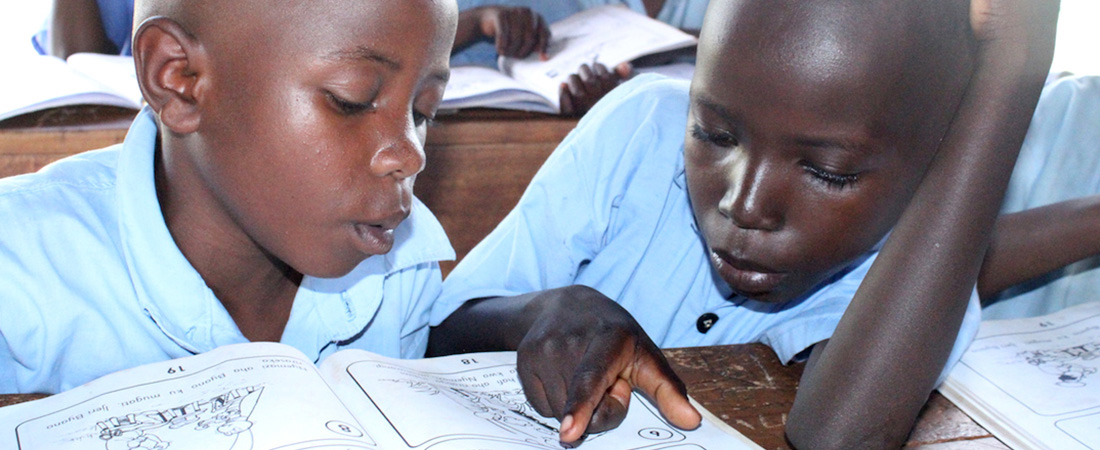Reading and Writing Go Hand in Hand

Read Right Now! (website)
Teachers and students in Rwanda are learning to write their own stories, creating culturally relevant materials for other young readers to share. A similar literacy program in Mali is creating a culture of reading supported by oral and written storytelling in thousands of classrooms. While both approaches put writing at the heart of reading instruction, each program has been customized to meet its country’s specific literacy education needs.
For decades, EDC has worked with governments, ministries of education, and school systems to improve literacy in developing countries. To support and sustain literacy development, a one-size-fits-all approach will not work. A successful classroom literacy program must adapt to many variables, including the beliefs, skills, and needs of teachers and students.
That’s why EDC is launching the Read Right Now! Toolkit, which represents the best of what EDC has learned from 15 years of creating literacy programs in resource-lean environments, and decades of literacy instruction work in the United States.
“Literacy starts with one word. A child writes their name on a chalk slate or paper bag or box. They recognize that the word means ‘me.’ Then they can read it to someone else. That’s the beginning of literacy—and possibilities.”
Norma Evans, Senior Technical Advisor, Literacy, Language, and Learning Initiative (L3), Rwanda
Read Right Now! is built around improving teachers’ capacity for instruction in four critical areas shown to increase reading ability: oral language development to improve vocabulary and listening comprehension; explicit instruction in areas such as phonological awareness, phonics, and fluency; authentic writing to help children develop an understanding of language structures and how to “crack the code”; and authentic reading to improve fluency, comprehension, and vocabulary while instilling an appreciation for reading.
“Many of the countries where we work take a more traditional approach to teaching reading,” explains EDC’s Nancy Clark-Chiarelli, an early education specialist. “The teacher will write a word on the board, and the children will sound it out and then memorize it by repeating it over and over again in choral recitation. Our program widens teachers’ repertoire of instructional skills and strategies to help them integrate oral language activities with reading and writing activities. Teachers still teach the critical component skills such as phonics, vocabulary, spelling, and comprehension, but they don’t stop there. They facilitate real reading and writing activities to help children see that reading and writing are vehicles to communicate, learn, and enjoy. We support teachers in providing writing and reading instruction that is taught in an integrated fashion to help children better and more quickly develop as readers. This is a new concept for many teachers.”
The Read Right Now! approach offers teachers training in how to teach students to write as they are learning to read. Another new concept for teachers is interacting with and fostering interaction between students, a departure from the traditional “chalk and talk” approach. Teachers learn to model skills for students, and then teachers and students carry out the exercise together. Students then work with partners to practice skills and independently to apply what they’ve learned.
To make sure new approaches to literacy match both teachers’ and students’ skill levels, Read Right Now! uses evaluation instruments developed by EDC in classrooms in Egypt and Benin. These include SCOPE (Standards-Based Classroom Observation Protocol for Educators), which measures teachers’ skills in classroom management; collaborative learning; fostering an active, student-centered learning environment; use of instructional materials; practicing gender equity; and eEGRA (Early Grade Reading Assessment), which assesses students’ reading skills.
Read Right Now! was developed and refined from EDC’s experience in Guinea, Madagascar, Egypt, Ghana, Indonesia, and Nigeria, to name a few countries. Currently, it is being used in the Philippines, the Democratic Republic of Congo, Mali, and Rwanda, and will soon be introduced in South Sudan and Zambia.
“Read Right Now! is very flexible,” Clark-Chiarelli says. “While the principles for what makes an effective reading program remain the same, this approach allows EDC to help educators, both at the ministry level and at the school and classroom levels, take action to improve literacy learning anywhere in the world.”